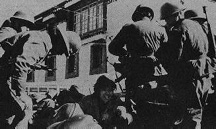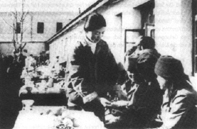
(AI) Amnesty Ireland Magazine
Issue 116 March 2002
Two young Tibetan nuns who were beaten and tortured in Drapchi Prison - Chuye Kunsang and Passang Lhamo - visited Ireland this January and saw the sea for the first time. Neil Steedman of Tibet Support Group Ireland reports.

As two of the "Drapchi Nuns", they were Amnesty International prisoners of conscience - but they were not allowed to receive any post while in prison. They were only permitted a five-minute visit once a month from each of two authorised relatives. During the visit they could only communicate through a small hole at a low level.
But these restrictions were perhaps the least of their difficulties. "The hardest part in Drapchi was the constant beatings and the torture when we were abused with electric cattle prods," the nuns explained. "We were also forced to stand in direct sunlight all day - sometimes with a glass of water on your head and holding newspapers under your arms and between your knees - and being beaten if you spilt any water, dropped a newspaper, or helped another prisoner in distress. We were also forced to do 'military exercises' for two or three hours non-stop, sometimes having to run across small stones in torn shoes or bare feet."
There was no dramatic improvement in the nuns' life after their release from prison. Chuye and Passang were not permitted to return to their nunneries, attend religious teachings, or take part in social events, and were constantly harassed by the authorities. Members of their families were also harassed.
So, with their hair still long to aid disguise, in March 2000 Chuye, Passang and two other nuns escaped from Tibet. They took 16 days, travelling by night through winter snows to reach Nepal. Eventually they made their way to Dharamsala in India, the Dalai Lama, and freedom.
Tour of Testimonies
Last year, Amnesty proposed that the two Drapchi nun escapees undertake a tour of Europe and the USA. Chuye and Passang are among the last political prisoners to escape from Tibet and were in Drapchi during the major disturbances and killings inside the prison in May 1998 - events that the Chinese authorities have consistently denied ever happened.
During their tour of Europe and the USA, Chuye and Passang are being supported by Amnesty and Tibet Support groups in each country they visit. In Switzerland, they will give testimonies to the UN Human Rights meeting in Geneva.
While in Dublin, (and well equipped with boots, hats and coats supplied by Irish supporters!), the nuns held a 'Prayers for Compassion' candlelit vigil at the Chinese Embassy, with support from members of Amnesty, Front Line, Tibet Support and Pax Christi.
In response to my questions, Chuye and Passang made two very telling responses. One was: "If the Chinese were to permit a free referendum among the Tibetan people, we are certain that 100% would vote for independence." The other said: "Even when we were being beaten in prison, we felt compassion for the Chinese prison wardens because of our faith. The most important thing is to be compassionate - even if we suffer, it could be of benefit to others."
When will the Chinese communist authorities learn these lessons - and begin to treat the Tibetan, Uighur, Mongolian and Chinese people who long for freedom and democracy with similar respect and compassion?
Articles About Tibet
Music
Novels